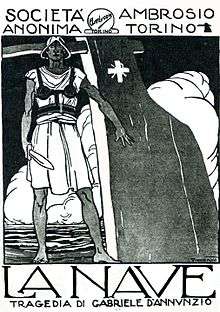The Ship (1921 film)
The Ship (Italian: La nave) is a 1921 Italian silent historical drama film directed by Gabriellino D'Annunzio and Mario Roncoroni and starring Ida Rubinstein, Alfredo Boccolini, and Ciro Galvani.[1] It is an adaptation of the play Il Nave by Gabriele D'Annunzio, father of the film's director.
| The Ship | |
|---|---|
 | |
| Directed by | Gabriellino D'Annunzio Mario Roncoroni |
| Produced by | Arturo Ambrosio |
| Written by | Gabriele D'Annunzio (play) Gabriellino D'Annunzio |
| Starring | Ida Rubinstein Alfredo Boccolini Ciro Galvani |
| Music by | Ildebrando Pizzetti |
| Cinematography | Narciso Maffeis |
Production company | |
| Distributed by | Unione Cinematografica Italiana |
Release date | 25 November 1921 |
| Country | Italy |
| Language | Silent Italian intertitles |
Cast
- Ida Rubinstein as Basiliola
- Alfredo Boccolini as Marco Gràtico
- Ciro Galvani as Sergio Gràtico
- Mary Cleo Tarlarini as La diaconessa Ema
- Mario Mariani as Il monaco Traba
_-_1.jpg)
gollark: But necessary.
gollark: Implode.
gollark: Why do you not run LineageOS or something?
gollark: Maybe yours don't.
gollark: They also purchased a bad phone, evidently.
References
- Nowell-Smith p.121
Bibliography
- Geoffrey Nowell-Smith. The Oxford History of World Cinema. Oxford University Press, 1996.
This article is issued from Wikipedia. The text is licensed under Creative Commons - Attribution - Sharealike. Additional terms may apply for the media files.